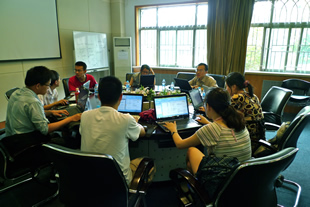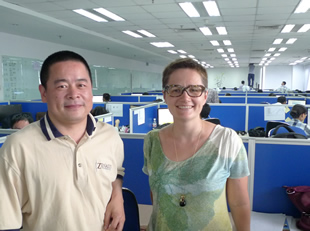Assistant Professor of Global Economics and Management
MIT Sloan School of Management
| Home | CV | Papers | Research | Teaching | Gallery |
(with Yanbo Wang and Jizhen Li)

Training research team.
In this project we seek to identify what kind of domestic resources returnee entrepreneurs need to derive the most benefit from their experiences abroad. We know that many entrepreneurs in developing economies encounter challenges stemming from weakly developed market institutions (Acemoglu, Johnson, and Robinson 2005). For example, entrepreneurs might find it hard to access finance, source the latest technology or find sufficient customers for their innovative products. One group of scholars (e.g. Saxenian and Hsu 2001; Saxenian 2006; Qin 2007; Nanda and Khanna 2010) argues that by tapping into resources in developed economies, returnee entrepreneurs can overcome the constraints of weak market institutions in developing economies.
While this view is plausible, the evidence on the performance of returnee firms is mixed (e.g. Amsden and Chu 2003; Obukhova 2007, 2010; Li et. al. 2011). For example, Obukhova (2010) finds that performance of firms established by returnee entrepreneurs in China varies depending on whether they have foreign investors. Surprisingly, a firm established by a returnee entrepreneur without a foreign investor might actually have a higher mortality rate than a comparable firm established by an entrepreneur without experiences abroad. This line of research suggests that at least some returnee entrepreneurs suffer from a lack of domestic resources, such as technology skills, management know-how and personal networks that are relevant for operating in a developing economy.

Interviewing High-Tech Entrepreneurs.
China is an excellent venue for examining these questions, both because of the enormous global significance of its economy and its recent flow of returnees, who are widely known there as “sea turtles” (a homonym for haigui, a Mandarin word for a returnee). China also provides a laboratory to examine how geographic variation in market institutions influences the value of a returnee’s foreign resources. Specifically, we expect that foreign resources will prove more valuable where market institutions are much more mature, such as in first-tier coastal cities like Beijing, than in second-tier inland cities, such as Xian and Chengdu.